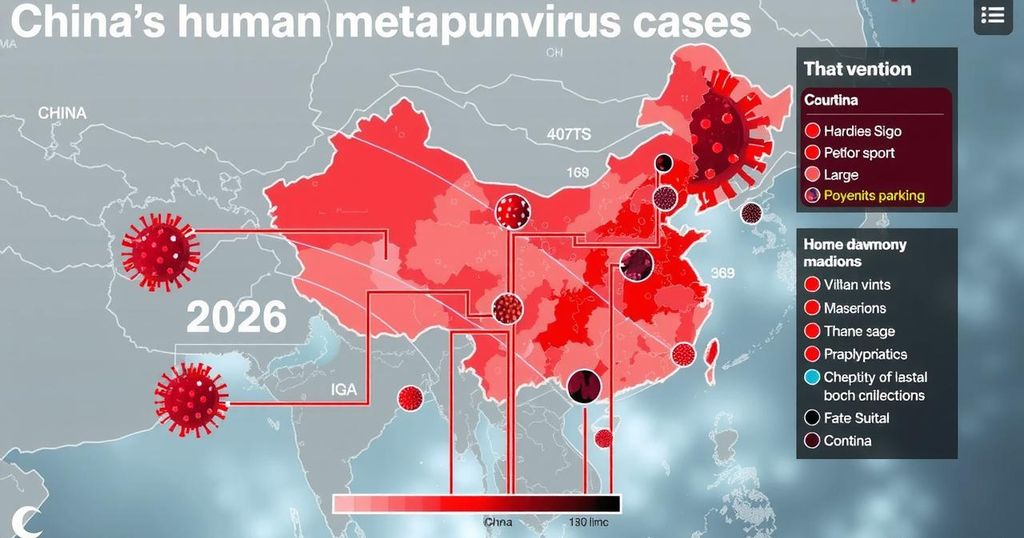Understanding Recent Surge in Human Metapneumovirus Cases in China
Recent reports indicate a rise in human metapneumovirus (HMPV) cases in China amid seasonal changes. HMPV, a well-known respiratory virus, predominantly affects children and immunocompromised individuals, though it typically results in mild illness. Experts believe this seasonal spike is not indicative of a pandemic threat, highlighting the importance of standard health precautions to manage infections.
In recent weeks, social media has disseminated images of overwhelmed hospitals in China, prompting concerns about a potential pandemic. Authorities in Beijing have confirmed a notable rise in cases of human metapneumovirus (HMPV), particularly affecting children, attributing this surge to a seasonal increase. Unlike COVID-19, however, experts emphasize that HMPV has been known for decades and that nearly every child experiences an infection by age five. While serious illness can occur in very young children and those with compromised immune systems, it remains largely mild for the majority of the population.
HMPV, first identified in the Netherlands in 2001, typically results in mild upper respiratory infections akin to the flu for most individuals. The virus spreads via direct contact or through surfaces contaminated by an infected person. Common symptoms include cough, fever, and nasal congestion. Vulnerable populations, especially children under two and immunocompromised individuals, are at higher risk of severe disease, which may involve respiratory complications requiring hospitalization. Dr. Hsu Li Yang, an infectious diseases physician in Singapore, notes, “Many will require hospital care, with a smaller proportion at risk of dying from the infection.”
The recent rise in HMPV cases in China aligns with the natural seasonal cycle of respiratory infections, which tend to peak during late winter and spring. This trend is partly attributed to survival advantages of the virus in colder temperatures and increased indoor gatherings during these months. Experts assert that similar spikes are occurring in other northern hemisphere countries, including the United States and the United Kingdom. Jacqueline Stephens, an epidemiologist from Flinders University, clarifies, “While this is concerning, the increased prevalence is likely the normal seasonal increase seen in winter.”
Comparisons between HMPV and COVID-19 have fueled public anxiety; however, experts contend that such fears are exaggerated. HMPV is an established virus with global presence and historical infections provide a degree of immunity to populations. Dr. Hsu indicates, “Almost every child will have at least one infection with HMPV by their fifth birthday,” which supports the notion that widespread immunity exists. Paul Hunter, a medical professor at the University of East Anglia, concurs, suggesting there are no signs of a significant global threat from HMPV at this time. Nonetheless, he and Dr. Hsu recommend standard precautions, such as wearing masks in crowded settings, practicing good hygiene, and receiving the flu vaccine.
The human metapneumovirus (HMPV) is a relatively common respiratory virus that can lead to mild infections, primarily affecting young children and individuals with weakened immune systems. First recognized in 2001, HMPV circulates globally and typically surges during the winter and spring months. Recent reports indicate a seasonal upsurge in HMPV cases in China, coinciding with colder weather conditions, which has raised concerns reminiscent of the COVID-19 pandemic. Despite these worries, public health experts emphasize that HMPV is not a novel pathogen like COVID-19, hence the risk level is markedly different.
In summary, while the recent increase in human metapneumovirus (HMPV) cases in China raises some concerns, experts predominantly regard it as a seasonal rise rather than a pandemic threat. HMPV is an established virus with a long history, and most individuals experience mild symptoms. Special attention must be given to vulnerable populations, but standard health precautions can be effective in mitigating the risks associated with HMPV infections. Overall, there is an emphasis on remaining vigilant without succumbing to unwarranted fears reminiscent of previous pandemics.
Original Source: www.bbc.com




Post Comment